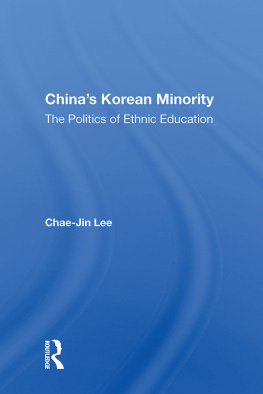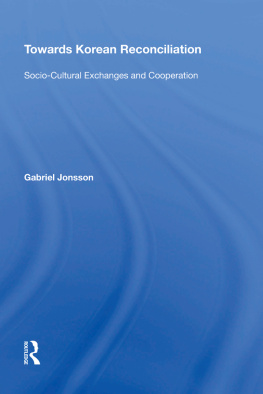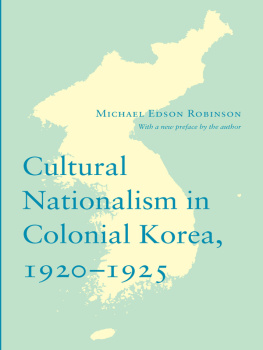JAPANS HIDDEN APARTHEID
First published 1997 by Ashgate Publishing
Reissued 2018 by Routledge
2 Park Square, Milton Park, Abingdon, Oxon, OX 14 4RN
711 Third Avenue, New York, NY 10017, USA
Routledge is an imprint of the Taylor & Francis Group, an informa business
Copyright G. Hicks 1997
All rights reserved. No part of this book may be reprinted or reproduced or utilised in any form or by any electronic, mechanical, or other means, now known or hereafter invented, including photocopying and recording, or in any information storage or retrieval system, without permission in writing from the publishers.
Notice:
Product or corporate names may be trademarks or registered trademarks, and are used only for identification and explanation without intent to infringe.
Publishers Note
The publisher has gone to great lengths to ensure the quality of this reprint but points out that some imperfections in the original copies may be apparent.
Disclaimer
The publisher has made every effort to trace copyright holders and welcomes correspondence from those they have been unable to contact.
A Library of Congress record exists under LC control number: 98118696
ISBN 13: 978-1-138-33929-3 (hbk)
ISBN 13: 978-1-138-33930-9 (pbk)
ISBN 13: 978-0-429-44114-1 (ebk)
Japans Hidden Apartheid: The Korean Minority and the Japanese tells the story of Japans Korean minority and its troubled relationship with Japanese state and society since World War II.
The story of Japans largest minority casts important light on the nature of Japanese state and society in general and minority relations in particular. This includes the changing parameters of Japanese state policy toward Asian peoples, social tension and conflict, and approaches by minority groups to assimilation and cultural preservation.
Hundreds of thousands of Koreans were brought to Japan in the 1930s and 1940s, during Japans colonial rule, many of them as semi-slave forced labor in mines and factories. They were the forebears of the 700,000 strong Korean minority in contemporary Japan, many of them in the second, third, or even fourth generation without Japanese citizenship and facing issues of discrimination and second class status.
A legacy of the Korean War has been the deep divisions within the Korean community in Japan, divided among groups aligned with North and South or independent of both. These divisions have shaped the responses of Koreans in Japan to issues of discrimination (such as the fingerprinting of aliens) and assimilation (Soren, the pro-North Korean group maintaining its own autonomous school system from nursery school to university).
In recent decades, as a result of the movements among Koreans, Japans changing relationship to Asian nations, and her response to international human rights campaigns and other factors, the position of Koreans in Japan has undergone important changes: it became possible for many Koreans to become Japanese citizens; compulsory fingerprinting and other indignities have been eliminated; the Soren Korean community and its schools have entered a period of crisis with the death of Kim U-Sung and with pressures from its members to acquire a Japanese education; Koreans in Japan spearheaded the movement to expose imperial Japans sexual slavery of the comfort women.
This volume documents far reaching legal and social changes as well as the continued legacies of discrimination in such areas as employment, education, and welfare that face the Korean minority. Koreans, who had Japanese citizenship under colonial rule, were deprived of that citizenship and the most minimal welfare benefits following World War regardless of individual wishes. Partial improvement in their situation began with the Japan-ROK Normalization Treaty of 1965 and continued with Japans 1979 ratification of the International Covenant on Human Rights which led to access to public housing and some local public employment; ratification in 1981 of the Treaty on the Status of Refugees brought standard welfare benefits including the national pension; in 1984 ratification of the Covenant on the Elimination of All Forms of Discrimination Against Women allowed nationality to be acquired through either parent. A 1991 agreement with the ROK led to relaxed and uniform permanent residence for all resident aliens, the end of fingerprinting, and appointment to regular teaching and some local government posts. Particular attention is paid to the intensely personal and symbolic issue of the legal status and use of Korean names against a background of forced adoption of Japanese names.
Issues of discrimination and assimilation are further explored in relation to the study of marriage patterns where mixed marriages have been the majority since the 1970s. Against these patterns of gains for the Korean minority, however, stand periodic outbursts of violence against Koreans and continued legacies of discrimination.
Many of the issues are given a human face through the experience, observations, and research of Korean activists. One of these is Yumi Lee, whose lengthy memoir on her own and her communitys experience constitutes one important foundation of the research for this book. Other contemporary Korean activists are also quoted.
Korean and Japanese names are as written in East Asia: the family names first followed by the given names. Yumi Lee however is an exception. Korean names are in principle romanised according to the McCune-Reischauer system but chaotic popular usage makes departures unavoidable.
Part One
OVERVIEW
Japan proclaims itself a homogeneous society of a unique and distinctive character. To the world at large, it is widely perceived as such. The Japanese establishment regards homogeneity as an essential element in its national ethos and power structure. It is credited as the key to Japans outstanding success in overall development among non-Western countries, ever since its opening to the world in the mid-nineteenth century. This claimed homogeneity is also said to explain Japans avoidance of the revolutions and other major convulsions which have affected all other major powers during the last few centuries.
It is true that by the standards of most large countries, Japan is relatively homogeneous. Nevertheless, out of a total population of 125 million about six million or over 6 percent of the population are minorities. According to the Kodansha Encyclopedia of Japan there are about three million Burakumin a caste of untouchables known pejoratively as the Eta [those full of filth] living in about 6,000 communities. Koreans, including those who have become naturalized (about 160,000), are close to 800,000 in number. Okinawans number a million plus. Foreign workers from Asian countries other than Korea make up another million or more.
Official Japan has, in the past, denied the existence of these minorities. As a signatory to the United Nations International Covenant on Civil and Political Rights, Japan has to submit reports to the United Nations with respect to the Covenants enforcement. The first report of 1980 stated flatly that minorities did not exist in Japan. The Ainu, indigenous people of Hokkaido, and other minorities strongly protested the report. As a result, when Japan submitted its second report in 1987, it stated that although minorities did exist, there were no minority problems.
Official Japan was forced to concede the existence of minorities when Prime Minister Nakasone in September 1986 claimed that Japan had a high intellectual level because it had no minorities. He drew a comparison with the United States: The level of knowledge in the United States is lower than in Japan due to the considerable number of blacks, Puerto Ricans, and Mexicans. The Japanese press hardly bothered to report this statement, but when an uproar of protest arose from the United States, Nakasone subsequently clarified his remarks. He stated that he had been misquoted and had only meant to point out that America had many remarkable scientific achievements to its credit despite the existence of so many troublesome minorities.












